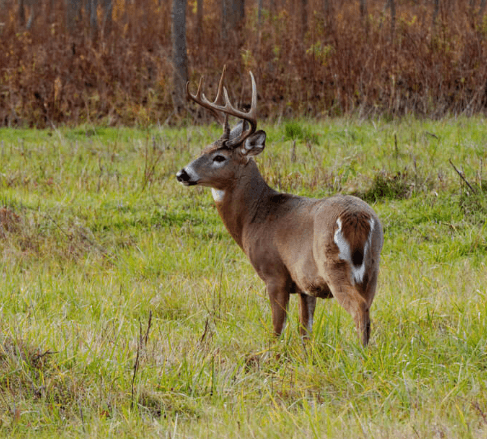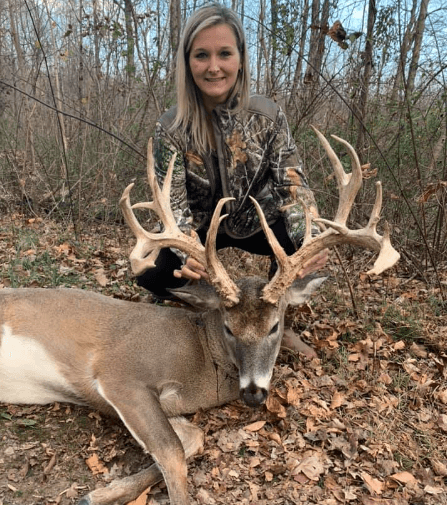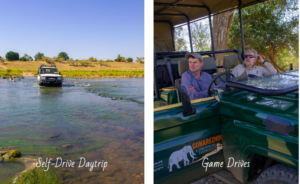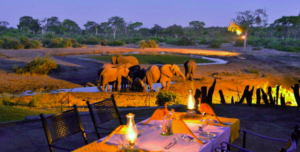
Ontario Deer hunting Full Guide
Welcome to the thrilling world of deer hunting in Ontario, where the ancient art of stalking and tracking collides with the majestic majesty of the Canadian wilderness. The province of Ontario, located in the heart of North America, provides hunters with an unparalleled chance to immerse themselves in a landscape teaming with beautiful white-tailed deer, making it a preferred destination for both seasoned hunters and newbies seeking the thrill of the hunt.
Ontario’s rich hunting legacy, wide swaths of virgin forest, and different ecosystems provide the ideal setting for an exciting hunting adventure. This province delivers a journey unlike any other, from the harsh topography of the Canadian Shield to the tranquil coastlines of its numerous lakes and rivers.
Whether you’re a seasoned outdoors enthusiast or a first-time hunter, Ontario’s deer hunting season calls with the promise of friendship, adventure, and the chance to connect with nature in a profound way. In this book, we will go into the heart of Ontario deer hunting, learning the ins and outs of this cherished activity. So gather your hunting gear, sharpen your senses, and prepare to be immersed in the thrilling world of Ontario deer hunting.
How to hunt deer in Ontario Full Guide.
Deer hunting in Ontario may be a rewarding experience if all restrictions are followed, safety is prioritised, and ethical hunting practises are followed. Here is a detailed guide about deer hunting in Ontario:
Obtain the Required Licences and Tags:
Check that you have a current Ontario Outdoors Card, which also acts as your hunting licence.
Purchase the necessary deer hunting licence and tags for the season and zone in which you intend to hunt.
For the most up-to-date information on seasons, bag limits, and rules, consult the Ontario Hunting rules Summary.
Choose Your Hunting Zone:
Choose where you wish to hunt in Ontario. Different zones have different restrictions and deer numbers, so do your homework and pick a zone that fits your needs.
Select Your Hunting Weapon:
Choose your favourite hunting method: archery (bow or crossbow), firearm, or muzzleloader. Check that your equipment is in accordance with Ontario requirements.
Review Safety Guidelines:
Learn about firearm safety guidelines and safe hunting techniques. Always handle every handgun as though it were loaded, and use responsible gun handling techniques.
Scout Your Hunting Territory:
Spend some time scouting your preferred hunting spot before the season starts. To recognise deer patterns and behaviours, look for deer indications such as tracks, scat, and feeding places.
Prepare Your Equipment:
Check the condition of your hunting equipment. Your weapon, ammo, clothes, boots, and accessories are all included.
To reduce your fragrance, dress in proper camouflage apparel and apply scent control measures.
Learn About Deer Behavior:
Learn about deer behaviour, such as eating, bedding, and movement patterns. This knowledge will assist you in selecting the best hunting places and times.
Make a Hunting Trip Schedule:
Make a hunting schedule that contains the dates, times, and places of your outings. Prepare to modify your strategy dependent on weather and deer behaviour.
Improve Your Shooting Technique:
Shoot with your selected weapon on a regular basis to guarantee accuracy and competence.
Observe Legal Shooting Hours:
Keep in mind that legal shooting hours normally begin half an hour before sunrise and last half an hour after dusk.
Maintain Ethical and Respectful Behaviour:
To minimise pain, practise ethical hunting by taking clean and compassionate shots.
Respect the property rights of other hunters and landowners, and always seek permission before hunting on private ground.
Field Dress and Process Your Deer:
Learn how to properly field dress and process a deer. This entails slaughtering, gutting, and skinning the animal.
Follow all rules and restrictions while transporting and tagging your harvested deer.
Please Report Your Harvest:
It is required to record your deer harvest. Use the Ontario Hunter Report Form, which is available online and at certain places.
Keep Up to Date:
Check the Ontario Ministry of Natural Resources and Forestry’s website to stay up to speed on hunting laws and any changes to seasons or bag restrictions.
Join a Hunting Group:
Joining a local hunting club or forum might help you connect with experienced hunters and receive useful information.
You may have a safe and successful deer hunting experience in Ontario if you follow these procedures and undertake sufficient research.
Deer Hunting Seasons Ontario

Deer hunting seasons in Ontario vary based on the kind of deer and the province’s hunting zone. The following is a general summary of Ontario’s deer shooting seasons. However, because seasons and rules can vary, it’s critical to verify the most recent regulations with the Ontario Ministry of Natural Resources and Forestry or a local conservation authority.
White-Tailed Deer:
Archery season typically begins in mid-September and lasts until the end of November. Firearms Season: Usually begins in November and lasts for a few weeks. Multiple weapon seasons, including rifle and shotgun seasons, are common.
The muzzleloader season begins in November, directly following the firearms season.
Mule Deer:
Mule deer hunting is authorised in some areas of Ontario, however the season and rules may differ from those for white-tailed deer. Hunters should research zone restrictions.
Black-Tailed Deer:
Black-tailed deer hunting is permitted in only a few regions in Ontario. Regulations differ, so check with your local authorities.
Season of the Crossbow:
During archery and rifle seasons, crossbow hunting is legal. There are rules in place.
Youth Hunting:
To encourage young hunting participation, Ontario has specific youth deer hunting seasons. These seasons usually take place in late September or early October.
Deer with No Antlers:
Ontario frequently establishes certain zones where antlerless deer (does) can be harvested. Regulations may limit the number of antlerless deer tags available to each hunter.
Special Seasons:
Special deer hunting seasons, such as regulated hunts for regulating deer populations in certain regions, may exist in some zones. These are subject to their own set of rules and draws.
When deer hunting in Ontario, hunters must get the required licences and tags, follow hunting zone laws, and prioritise safety.
Best place to hunt deer in ontario

Determining the actual “best” area to shoot deer in Ontario is subjective and relies on a variety of factors, including the species of deer you want to hunt (white-tailed or mule deer), your favourite hunting style, and your individual preferences. Ontario is a huge province with different landscapes, and some places are noted for good deer hunting chances. Here are a few noteworthy places to consider:
Algonquin Provincial Park Region:
This central Ontario region is known for its white-tailed deer population and offers a combination of deep forests and clearings, making it an ideal hunting spot.
Eastern Ontario:
Eastern Ontario counties like as Renfrew, Frontenac, and Lanark are famous for white-tailed and mule deer shooting. Farmlands, woodlands, and marshes dot the diverse terrain.
Northwestern Ontario:
White-tailed deer hunting chances abound in the areas surrounding Thunder Bay, Kenora, and the Rainy River District. The wide countryside and numerous lakes provide for an ideal hunting setting.
Algoma District:
The Algoma District in northern Ontario is well-known for its large population of white-tailed deer. The rocky terrain and plentiful wooded areas make it a popular deer hunting site.
The Niagara Region:
Due to large deer populations, certain urban areas on the Niagara Peninsula allow urban deer shooting. This provides exceptional hunting possibilities.
Manitoulin Island:
This big island in Lake Huron offers white-tailed and black-tailed deer shooting chances. Its varied environments, which include woods and farmlands, make it an appealing hunting area.
Huron County:
Huron County, located in southern Ontario, has excellent farmlands that attract white-tailed deer. Hunting in this rural area may be a rewarding experience.
Haliburton Highlands:
This central Ontario location is ideal for white-tailed deer hunting due to its combination of woods and lakes.
Frontenac Arch Biosphere Reserve:
This region in southeastern Ontario is home to a variety of species, including white-tailed deer. It provides a one-of-a-kind hunting experience in a natural preserve.
Consider your individual goals, tastes, and the sort of experience you’re looking for when deciding where to go deer hunting in Ontario. Furthermore, always verify the most recent hunting rules, secure the necessary licences and tags, and prioritise safety and ethical hunting practises during your expedition. Local outfitters and guides can also give useful information and assistance for a successful hunt.
Related
7 Best White-tailed Deer Outfitters In Kentucky With Full Guide On How To Hunt.
Mississippi Deer Hunting Adventures Full Guide.
Caribou Hunts in Quebec, Embarking on an Epic Journey.
Saskatchewan Whitetail Hunts, Embark on an Unforgettable Adventure.
FAQs about deer hunting Ontario.
What types of deer are commonly hunted in Ontario?
The white-tailed deer is the most regularly hunted deer species in Ontario. Black-tailed deer can be found in certain locations, and mule deer can be found in others.
Are there any restrictions on the use of bait when deer hunting in Ontario?
Yes, there are laws in Ontario that govern the usage of bait. Baiting is legal, however there are some norms and limits. Check the Ontario Hunting laws Summary for further information on baiting laws in your hunting zone.
Can non-residents go deer hunting in Ontario?
Non-residents of Ontario are permitted to shoot deer in the province, but they must get the necessary non-resident hunting licences and tags. Non-resident hunters should be informed of the rules and fees that apply to them.
In Ontario, are there any deer special seasons or restricted hunts?
To manage deer numbers, Ontario may establish special seasons or limited hunts in select locations. These hunts may have specific restrictions and may need hunters to apply for tags via a draw system.
Is it legal in Ontario to use deer smell attractants or calls when hunting?
Yes, hunters can boost their chances of success by using deer smell attractants and calls. However, please use these tools carefully.
Are there any restrictions on transporting harvested deer in Ontario?
Yes, there are rules in place for moving deer in Ontario. When transferring your harvested deer from the hunting location, you should follow the procedures for tagging, sealing, and documenting it.
Can I hunt deer in Ontario during the rut (breeding season)?
Yes, deer shooting seasons in Ontario frequently coincide with the rut because deer are more active and visible at this time. During this time, hunters frequently have the opportunity to harvest mature bucks.
Can I go deer hunting on Crown land in Ontario?
Yes, hunting on Crown property is typically legal in Ontario, but you must follow hunting restrictions and special land-use plans. Be advised that certain Crown land sites may be subject to limitations.
In Ontario, are there any deer special seasons or restricted hunts?
To manage deer numbers, Ontario may establish special seasons or limited hunts in select locations. These hunts may have specific restrictions and may need hunters to apply for tags via a draw system.
How do I report my deer harvest in Ontario?
In Ontario, you must register your deer harvest. The Ontario Hunter Report Form, which is available online and at certain places, can be used. Reporting your catch is critical for wildlife management and protection.
Can I go mule deer hunting in Ontario?
Mule deer hunting in Ontario is restricted to specified locations, and laws may differ from those for white-tailed deer hunting. Mule deer hunters should check the hunting restrictions for the individual zones where they are authorised.






